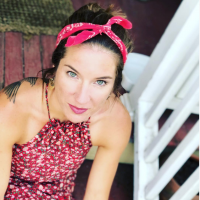Kobe Bryant was not perfect. Like all of us, he was flawed and complicated, and that is part of his legacy, too. https://t.co/HkkDlvYqiO
— Nancy Armour (@nrarmour) January 27, 2020
Our hands were chalky, our fingers were cold, and our phones—surprisingly—had cell reception.
I was rock climbing in Colorado with some friends this past weekend, throwing myself at boulders with carefree yet calculated risk, when my friend Emily picked up her iPhone and opened Instagram.
“Kobe Bryant died?” She said, looking at us like we’d have confirmation. We gaped at her, indicating that this was brand new information. I was the first to wrap my head around what she’d said.
“Kobe Bryant?” I asked in disbelief, hopping over a few rocks to go look at her phone.
It was the beginning of a developing story that was making its way around the world. Kobe Bryant, his daughter, and seven others: dead in a helicopter crash.
Knowing little aside from his legendary basketball status with the Lakers, I tuned in to the news on my way home from climbing. I listened to everything-Kobe; his mentorship, kindness, discipline, and then—the rape case of 2003.
By the time I pulled into my driveway, I had a grip of questions for Google. Even though the media had all kinds of opinions about Kobe’s legacy and the rape, there were only two options in the rigidity of my brain:
- He raped her and therefore deserved none of the accolades or remembrance.
- He did not rape her, and his death was truly tragic and untimely.
Determined to get to the bottom of it, I spent hours poring over articles, oscillating between his story and her story. I read about the accuser’s blood and DNA being on Kobe’s shirt. I read about her mental illness history and attempted suicide. Like a crazed detective too late to the scene, I obsessively scrutinized over the evidence and tried to find his innocence or blame.
When my eyes couldn’t take the screen anymore, I took a break and turned on the shower. Looking in the mirror, my eyes were red and my brow had a crease where I’d been scrunching my face in consternation.
Why is this consuming me? I wondered. Why am I obsessed with finding the truth?
And then, the answer:
Because you’re working out your own rape case from 13 years ago.
I was college-age, and smitten with a boy who had a California surfer vibe that made me swoon. We’ll call him Todd.
Subconsciously, I’d been documenting all the similarities between my case with Todd and Kobe’s case with his accuser: Todd and Kobe were the same age; the accuser and I were the same age; both encounters had started off consensual; both encounters ended with ignored pleas of “no.” And, in the same way that I felt the need to put Kobe in one of two categories, I had been struggling with the same need to place Todd in similar confines:
- Todd was evil; I just didn’t see his evil coming.
- Todd was not evil, and the rape was my fault.
The first option (“he was evil”) had always been easy to access but my consciousness rejected the notion because I could recall his big smile, easy laugh, and jovial demeanor. Such a concrete definition of Todd never felt right, but neither did the second option (“he was not evil, and the rape was my fault”).
Option two was dismissed because I could all-too-easily remember Todd’s strong hands over my wrists as I stared up at the cheap, white ceiling fan with watery pain-filled eyes. Any time I tried to brush it off as my fault, I’d hear my own words asking repeatedly, “Todd stop,” and him saying, “Let me finish.”
Until the news of Kobe Bryant’s death, I hadn’t been able to process any of this, so the experience lived on in limbo. Assigning blame, removing blame, assigning blame, removing blame, ad infinitum.
After my shower, I came across a psychology term: dual processing. This theory suggests that our cognitive thinking has two pathways: pathway number one is fast, automatic, and involuntary, such as, “he’s evil.” Pathway number two is slow, deliberate, and involves consciously working through different considerations.
I realized that my peace is dependent upon engaging with pathway two—a more effortful but ultimately more freeing course. I can consider the fact that Todd was not evil, but he hurt me. I can consider the fact that he grew up in a male-dominated world where consent and the #metoo movement had not yet burst through the walls of society.
Todd can be a good person who did a bad thing—just like Kobe Bryant.
Thirteen years later, I’m finally making progress in processing. My healing is not done, but I’m grateful that the experience of others can spark a new beginning.
In a really messed up, tragic way, the end of Kobe’s life brought new meaning to mine.
~








Read 6 comments and reply